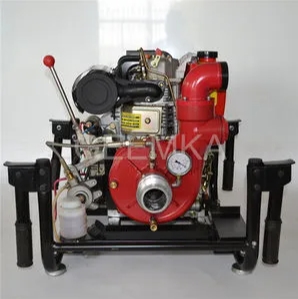Choosing the right lubricating oil for a diesel engine water-cooled pump
Choosing the right lubricating oil for a diesel engine water-cooled pump is crucial for ensuring the engine’s longevity, efficiency, and reliable performance. The lubrication system plays a vital role in reducing friction between engine components, minimizing wear and tear, and preventing overheating. Selecting the appropriate oil is essential for keeping the engine in peak condition. Below, we’ll discuss some key factors to consider when choosing the right lubricating oil for a diesel engine water-cooled pump.
The first and most important consideration is the viscosity of the oil. Viscosity refers to the oil’s thickness or resistance to flow. Diesel engines require oils with a viscosity suitable for the engine’s operating temperature and conditions. For water-cooled pumps, the oil needs to maintain a consistent viscosity across a range of temperatures. In general, multi-grade oils, such as 15W-40 or 10W-30, are commonly recommended for diesel engines, as they perform well in both cold and hot environments. The first number (before the ‘W’) refers to the oil’s viscosity at low temperatures, while the second number refers to its viscosity at higher operating temperatures. Choosing the correct viscosity ensures that the engine is properly lubricated under all operating conditions, preventing excessive wear and heat buildup.
The type of oil—whether mineral, semi-synthetic, or full synthetic—also plays a significant role in the engine’s performance. Mineral oils are derived from refined crude oil and are typically less expensive but may require more frequent changes due to their shorter lifespan. Semi-synthetic oils are a blend of mineral and synthetic oils, offering a balance between cost and performance. They provide better protection and longer intervals between oil changes than mineral oils. Full synthetic oils are chemically engineered and provide superior performance, especially in extreme conditions. They offer better protection against high temperatures and oxidation, making them a popular choice for modern diesel engines used in demanding environments. For diesel engine water-cooled pumps, full synthetic oils are often preferred for their extended service life and improved fuel efficiency, especially in high-performance or heavy-duty applications.
Another critical factor to consider is the API (American Petroleum Institute) classification of the oil. Diesel engine oils are categorized into different grades based on their performance characteristics. For example, the API CJ-4 grade is commonly recommended for modern diesel engines, offering superior protection against soot, wear, and corrosion. It also ensures compatibility with emission systems, such as diesel particulate filters (DPF). Be sure to select an oil that meets or exceeds the specifications recommended by the engine manufacturer to ensure optimal performance and protection.
Additionally, the additives in the oil can provide various benefits for the engine. These additives help in reducing friction, preventing corrosion, and cleaning engine components. Some oils contain detergents that prevent sludge and carbon build-up, which is particularly important in water-cooled diesel engines that operate under variable loads. Anti-wear additives such as zinc and phosphorus protect critical engine parts, like the camshaft and valve lifters, from premature wear. Choosing an oil with the right additives can significantly enhance the engine’s durability and performance, reducing the likelihood of costly repairs.
Lastly, it is essential to consider the oil change intervals. Regularly changing the oil is key to maintaining the engine’s health. While synthetic oils have longer service intervals, it’s crucial to follow the manufacturer’s guidelines for oil changes to avoid the buildup of contaminants that can degrade the oil’s effectiveness. Regular oil checks and changes also ensure that the pump operates smoothly, preventing damage from lack of lubrication.
In conclusion, selecting the right lubricating oil for a diesel engine water-cooled pump is vital for maximizing performance, extending engine life, and minimizing maintenance costs. By considering factors such as viscosity, oil type, API classification, additives, and maintenance intervals, operators can make an informed decision that ensures their pump operates efficiently and reliably. Regular oil maintenance will ultimately lead to reduced downtime and a longer lifespan for the diesel engine water-cooled pump.




